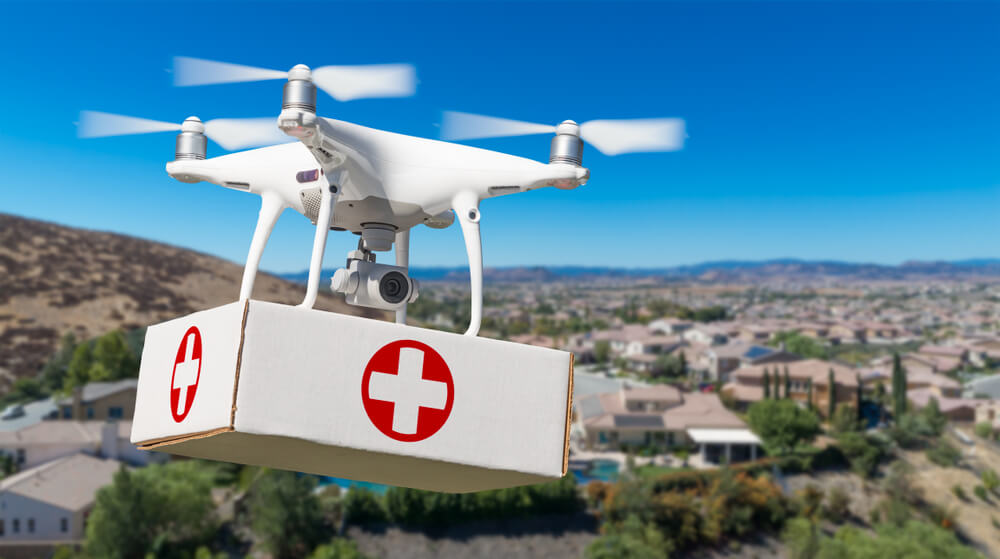How drones deliver medicines, vaccines to hard-to-reach communities in Kaduna
Health they say, is wealth, and without health human life is threatened. This was the case of many community healthcare centres in Kaduna State where problems, ranging from insecurity to dilapidated roads, prevented them from accessing healthcare. This narrative however is changing in Kaduna with the drone medical supplies services being executed by Zipline, a […]

Health they say, is wealth, and without health human life is threatened. This was the case of many community healthcare centres in Kaduna State where problems, ranging from insecurity to dilapidated roads, prevented them from accessing healthcare.
This narrative however is changing in Kaduna with the drone medical supplies services being executed by Zipline, a drone delivery company that is partnering with the state government.
Daily Trust recalls that in 2021, the Kaduna State Government during the administration of Malam Nasir El-Rufa’i, signed a Memorandum of Understanding (MoU) with the US Zipline company to address the logistics issues and improve the delivery of medicines to hard-to-reach health facilities.
Since then, over 10,000 deliveries to different hard-to-reach facilities within two years of operation where they supplied essential medicines, vaccines and blood supplies to various health facilities across the state.
Afiniki Luka spoke on how she was on the verge of collapsing when she was giving birth to her third child at the Primary Healthcare Centre in Pambegua, Kubau LGA of the state.
Being B negative, she was unable to get a match after losing a lot of blood during delivery, and her family even resorted to self-help, but there was no match.
The PHC put a call to Zipline, luckily they had the blood in stock and within minutes, the hospital received the supply and her life was saved.
She said, “If not for the quick response, I would not be here telling this story because it would have taken hours to get the blood to the healthcare centre by road and I am glad this new innovation has come to stay because it will save the lives of many women and children and reduce the cases of maternal mortality.”
Our correspondent, who visited the Zipline Drone facility in Pambegua, as well as some health facilities receiving the services, witnessed the dispatch of the over 200 deliveries made daily.
The Second In-charge of a health clinic at Hayin-Gada Nasaru community in Kubau LGA, Tasiu Abdullahi, said they are now five minutes away from the central drug store.
“Before we started receiving drugs from Zipline, it used to take about three to five days to get our orders if we sent a request to the state drug store in Kaduna, but today, in less than five minutes the drugs will arrive,” he explained.
According to him, there were times they experienced stockout of some commodities and consumables because the State Drugs Supplies Management Agency could not deliver them due to distance and lack of access roads and meeting the demands of clients became difficult.
“But today, if it is a single item you need very urgently, you can just place a call and get it as fast as five minutes without keeping a patient waiting.
“This is one of the best things that have happened to our state and we hope to see more improvement in their services,” Tasiu added.
Samuel Noma, Operations Manager, Zipline Nigeria, said the drone service is currently operational in 291 facilities within 12 local government areas in the state, adding that the company plans to launch two more distribution centres in Kafanchan and Birnin Gwari, to enable it to cover the whole state.
“The whole essence is to support the government in its efforts to reduce the rate of maternal, neonatal and child deaths in Kaduna State, especially the hard-to-reach communities.
“Zipline’s coming has taken away the stress of health workers going a long way to get medicines; it is now easier and they have more time to attend to their clients because it is delivered to them at their duty post.
“It is also complimenting the efforts of the government by reducing unemployment. A lot of us have benefited from it because over 90% of staff here are from Kaduna State. We have had a lot of training on how to use these technologies and we are also transferring the skills to a lot of indigenes here,” Noma stated.
He further explained that “The health facilities make orders for drugs they will need in a day and, most times patients are there in the health facilities. We provide them with what they need for that particular period.”
“The average time from receiving the order to flying is five minutes. At present, we are running at capacity where we do 150 deliveries per day. It depends on the number of health facilities making requests at a time,” he said.
Also, Mr Jeremiah Dunah, the Head of Flight Operations, disclosed that the drones travel at a speed of 100 kilometers per hour.
He, however, said if the wind is too strong, the drone would warn the flight operator to monitor the situation or to avoid flying that route.
“The drones use two GPS and backup networks; connectivity issues are something else that could be a real problem. In this case, the drones can make autonomous decisions and could return to the operations office when something does not go well,” Dunah said.
From Maryam Ahmadu-Suka, Kaduna
